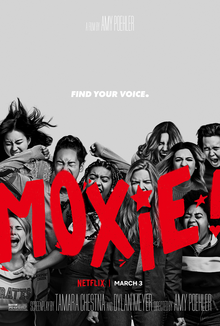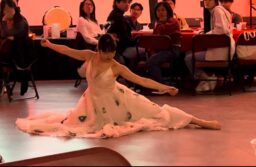
Photo courtesy of Fair Use, Wikipedia
Netflix’s latest original film “Moxie” was released on March 3. Based on author Jennifer Mathieu’s 2015 book “Moxie: A Novel,” the film is a teen coming of age movie focused on generations of radical feminism.
Following 16-year-old Vivian, played by Hadley Robinson, a group of girls take action against the sexism, mistreatment, and harassment happening within their school. The film by Amy Poehler, who directed and starred in the film as Vivian’s mom Lisa, can be defined as a young adult version of Disney’s “Radio Rebel” with a noticeable “Mean Girls” influence, another movie Poehler starred in back in 2004.
The Moxie is a zine written secretly by Vivian after she witnessed Lucy Hernandez, played by upcoming actress Alycia Pascual-Pena, having a hasty interaction with Mitchell Wilson, played by Patrick Schwarzenegger, son of Arnold Schwarzenegger.
The idea for the zine stems after Vivian has a talk with her mother about her teen years of rebellion. The Moxie zine is used as a platform for the voices of the girls of Rockport High School to be heard and stand up to sexism.
The Moxie’s rebellion group came to be after the male students created a disdainful rank list. This included categories such as “Best Rack,” “Most Bangable,” “Best Ass,” “Most Obedient’’ and one category that is so degrading we are only given the hint that it begins with a C.
What unites the Moxie Rebels is the principal and other school authorities not taking initiative when female students would speak on the harassment occurring within the school and the sexist dress code system.
Lucy brings her issue of harassment from Mitchell to the principal, but it’s pointless. The principal responds to the word “harassing” with “There’s that word. If you use that word I have to do a bunch of stuff.”
The principal in this scene tries to convince Lucy to replace the word “harassing” with “bothering,” completely downplaying her emotions in an attempt to protect Mitchell as well as the school. The principal later states she wants nothing to do with anything that does not involve the school itself. This type of response occurs on many occasions throughout the movie, specifically when the rank list leaks and Lucy once again goes to the principal for help, only to receive the same response.
This is a representation of how women are not taken seriously when it comes to their safety. If a woman accuses someone of making her uncomfortable and that person happens to hold power to their name, her experience automatically becomes irrelevant.
Lucy, Vivian and five other girls take matters into their own hands as the Moxie Rebels. Throughout the movie, the girls rebel by wearing spaghetti straps to school and planning out mini-events to showcase support for the Moxie group as a whole. Additionally, Vivian continues to write articles anonymously calling out the bullshit surrounding her
In addition to the rebellious feminism featured in the film, it is still a coming of age story, meaning we get family drama, love interests, and best friend issues. All of these are inevitable aspects of being a teenager. I appreciated how even though the actors were not teens, they looked like actual high schoolers. The way these characters spoke was an accurate portrayal of generation Z.
Mathieu did a great job at portraying how lightly schools take reports of harassment, and their attempts to brush it under a rug. Poehler did a great job bringing it to life. However, it was underwhelming how the choice of rebellion was only wearing tank tops.
A line emphasized in the film is “If you aren’t doing anything you are part of the problem.” This perfectly summarizes Mathieu and Poehler’s message for people to take action to make a change.
3/5 stars
ajones8@ramapo.edu





